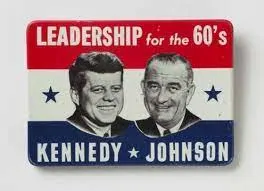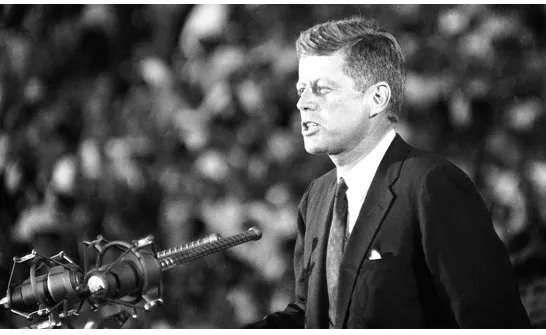The New Frontier was the slogan which President John F. Kennedy used when setting out his vision of America’s future.
Origin of “New Frontier”
Kennedy first used the phrase when he accepted the Democratic party’s nomination for the presidency, on July 15, 1960.
Kennedy hearkened back to FDR’s New Deal and to Woodrow Wilson’s New Freedom. But the New Frontier, JFK said, was something different.
Instead of a plan for improving the lives of ordinary Americans, the New Frontier was a set of goals for Americans to achieve.
As JFK said, describing the troubles that America had already faced:
Some would say that those struggles are all over, that all the horizons have been explored, that all the battles have been won, that there is no longer an American frontier.
But I trust that no one in this assemblage would agree with that sentiment; for the problems are not all solved and the battles are not all won; and we stand today on the edge of a New Frontier — the frontier of the 1960’s, the frontier of unknown opportunities and perils, the frontier of unfilled hopes and unfilled threats.
Woodrow Wilson’s New Freedom promised our nation a new political and economic framework. Franklin Roosevelt’s New Deal promised security and succor to those in need. But the New Frontier of which I speak is not a set of promises. It is a set of challenges.
After Kennedy’s election, the term became synonymous with the collection of policies he put forward, similar to Franklin Roosevelt’s New Deal, or LBJ’s Great Society. Everything from the Bay of Pigs Invasion to his tax cuts became part of the New Frontier.
JFK’s New Frontier policies focused on domestic programs to expand education, widen the social safety net, and encourage Americans to serve those in need.
The Peace Corps, a program which sent young volunteers overseas to help those in need, was probably one of the best-known New Frontier programs. JFK also expanded social security benefits, raised the minimum wage, and reformed housing law.

Kennedy assassinated
But most of the president’s ambitious agenda went dormant, in large part because Kennedy’s life was cut short in 1963.
Kennedy had planned to create programs to provide far-reaching medical care for elderly Americans and to provide federal aid for college education. The proposed New Frontier legislation would also have funded an urban mass transit system and a Department of Urban affairs. JFK had also planned to pump money into development projects in Appalachia.
None of those programs was enacted during Kennedy’s brief tenure.
However, it can be argued that the main thrust of JFK’s New Frontier was not creating new government programs but was, rather, focused on energizing and inspiring ordinary Americans.
The president spoke out about civil rights, inequalities, and economic disparity. His acceptance speech at the 1960 Democratic convention directly addressed idealistic young Americans, calling on them to get directly involved in making the country a better and fairer place.
His language became grandiose and even biblical at times:
I am asking each of you to be pioneers on that New Frontier. My call is to the young in heart, regardless of age—to all who respond to the Scriptural call: “Be strong and of a good courage; be not afraid, neither be thou dismayed.”
More broadly, the Kennedy era was termed “Camelot” by First Lady Jackie Kennedy.

Use of “New Frontier” in a sentence
- The “New Frontier” was a term used by President John F. Kennedy in his acceptance speech at the 1960 Democratic National Convention, where he outlined his vision for America’s future, including advancements in science, civil rights, and social welfare.
- Kennedy’s “New Frontier” policy initiatives aimed to boost the economy, provide international aid, and fund space exploration, reflecting his belief that it was a time for America to break new ground and conquer new challenges.
- Despite the challenges Kennedy faced in getting many of his “New Frontier” proposals through Congress, the term continues to symbolize an era of optimism and progress in American politics.